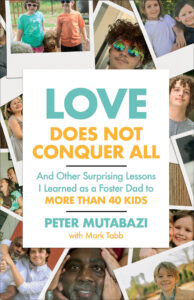Opening Yourself Up to Continuous Learning as a Christian Parent
Learn how one Christian parent handled food hoarding with grace, creativity, and patience—offering hope to others navigating similar challenges.

I first noticed the smell.
Then I saw the ants. Lots and lots of ants. I had a pretty good idea who the culprit was and why he did it. Joseph had not lived with me as a foster child for long, but long enough for me to learn he hoarded food. He was one my first hoarders, but he wouldn’t be my last.
Food hoarding is not unusual in children who have lived with food insecurity.
“I didn’t do it,” he lied to my face.
When a Child Acts Up
I don’t have a lot of rules in my house, but not lying to me is at the top of the list. Even more, the act of taking food felt like he was stealing from me. Again, I don’t have a lot of rules, but not stealing from me is also near the top of the list.
I faced a dilemma. Joseph was engaging in behavior that could not continue. It had to stop right away, or the ants were going to claim my house as their own. Joseph had also broken two major rules in the Mutabazi household. Surely there had to be some form of correction I could use, perhaps taking away some privileges until Joseph learned to stop hiding his dinner in his room. After all, that’s what all parents do, right?
As it turns out, “what all parents do” is rarely what needs to be done.
Rather than punish Joseph, I sat down with him and asked him a simple question. “How did this food get in your room?”
He looked me in the eye with all sincerity and said, “I think the food walked in here.”
There it was, another lie. On top of that, it was a ridiculous lie.
I took a deep breath and replied, “Okay. Please, next time you see food walking up the stairs, will you tell me so that I can stop it?”
Joseph smiled at me and said, “Okay. I’ll do that.”
A few days later I found more food in his room. Again, I did not yell. Instead, I said, “Joseph, you said you were going to tell me the next time you saw food walking in here, but you didn’t.”
“Okay. I’m sorry. Next time I will tell you,” Joseph said.
We played this game for several days until the food stopped walking up the stairs. At the same time, I made a second snack basket like the one I already kept on the counter in the kitchen. I placed this one at the top of the stairs near Joseph’s room. Now food was accessible to him anytime he wanted it.
Think Outside the Box
I wish I could say that I came up with this strategy right after I first discovered the hoarded food. It actually took me several months to get there. To solve the issue, I had to dismantle my preconceived ideas about what the practical solution should be before I could truly learn how to help my child.
I find it valuable after every confrontation or unusual episode with my kids to take time to review my actions to see what I can do better the next time. (And there will always be a next time.) I ask myself if I reacted or responded to my child. Did I focus on teaching, or did I go straight to trying to change behavior that was driving me crazy? Did I get on my child’s level and communicate in a way they could understand? Every crisis, every situation that leaves me thinking, Wait, what?!, is a chance for me to learn, but only if I set aside time to do that.
Finally, much of what I have learned as a parent has come from other parents who face the same daily challenges I do. Find a group of parents who are in the same stage of parenting and learn together. Just knowing you aren’t alone can give you hope.
Reflection:
How can you rethink your approach to certain parenting challenges to embrace a new viewpoint on how to solve the problem? Are there any other parents you can reach out to for advice?
If you enjoyed this post, check out the book Love Does Not Conquer All: And Other Surprising Lessons I Learned as a Foster Dad to More Than 40 Kids by Peter Mutabazi. A former street kid, Peter Mutabazi knows what it feels like to grow up in a world where love, caring, and kindness are nowhere to be found. But as the adoptive father of three and a foster dad to more than forty children, he also knows what a difference it makes when a child experiences the positive influence of an attentive and loving parent, and has learned many surprising but game-changing parenting lessons along the way.

Peter Mutabazi is an entrepreneur, an adoptive dad of three, a foster dad, and the founder of Now I Am Known. A former street kid who has worked for World Vision, Compassion International, and the Red Cross, Peter is a passionate and popular speaker, as well as the author of Now I Am Known. He lives in Charlotte, North Carolina. Learn more at NowIAmKnownFoundation.org.







